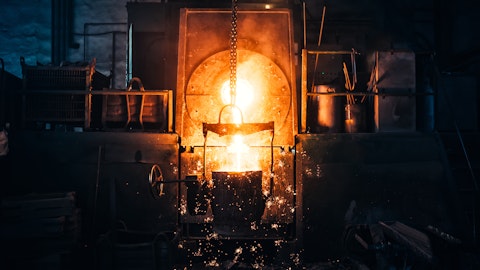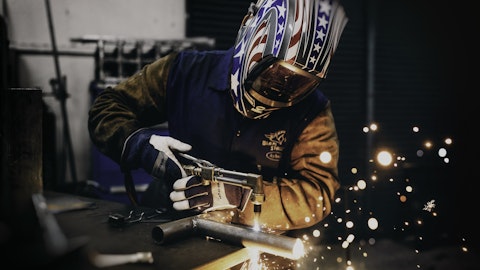Rochus Brauneiser: Okay. And yeah, on — can you know, just — if I got that right, what you said before, technically, when — during the signs of higher energy costs, when you put steel on inventory, it means the higher energy costs are baked into the cost valuation in your books in the end of the day, yeah?
Genuino Christino: Correct. Correct.
Rochus Brauneiser: Okay.
Genuino Christino: Yeah. So the revaluation, it’s always done, because taking to account everything fixed costs, everything. So it’s the full EBITDA cost.
Rochus Brauneiser: Okay, great. Thank you.
Operator: Thanks, Rochus. So we’ll move now to Bastian at Deutsche Bank. Go ahead, Bastian.
Bastian Synagowitz: Hi. Thanks. Good afternoon all. I just only have two quick questions, please. Just first of all, on volumes and also your volume outlook, from what I understand, you take out another blast furnace and force in France, if I understand that correctly, that will happen towards the end of the fourth quarter. And then, I would obviously suggest that you expect Q1 to be potentially flat or worse. And if I understood you correctly, you’re expecting de-stocking to ease in the first quarter. So I’m wondering, could you maybe help us to reconcile this? Are there any plans, that you may actually bring back capacity at other places? That would be my first question.
Genuino Christino: Yeah. No, Bastian, we — I think it’s important also to put in perspective, right? So the — some of the finances that we brought down, I think there is a combination here of maintenance that would happen regardless. So that’s the case of one of our finances in Idling that is down for about six weeks. So that financial will be back towards the end of end of the quarter, right? And then, some of the other Idling finance, it’s really as a response to the current very weak apparent steel demand that we are seeing. And we are also doing it, to some extent, to control and make sure that we don’t end up ourselves with more inventories than what we needed. And the company as a company, we will retain a lot of flexibility because we can bring back the finances relatively quickly in case our expectation of better parent steel consumption of demand next year really materialize.
We’re going to be in a position to do that. I think what is important and the message is that we are also, of course, focused on making sure that we retain our market share. So I would not like in this call that you guys walk away with the idea that we are taking more pain than the rest of the industry. So a lot of focus on making sure that we retain our market share.
Bastian Synagowitz: Okay. Thank you. Thanks for clarifying. Then my second question is on CO2 certificates. If we look at your shipment volumes, they’ve obviously been trending weak already. And then, I guess, with your production cuts, you will potentially be left with some excess CO2 certificates. Just to confirm, do you hold on to any excess allocations here, just given the relevance of those, also for, I guess, the next couple of years or have been — as you’ve been possibly selling some into the market as you used to do at some point over the last couple of years.



